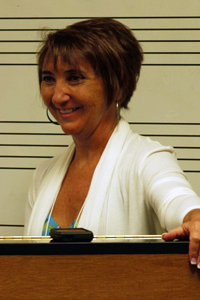Don't see what you're looking for?
Main Site
Berklee.eduCampuses and Schools

Photo by Phil Farnsworth
Marcelle Gauvin
For media inquiries, please contact Media Relations
- Head of the Jazz Voice studio at the University of Massachusetts Dartmouth
- Teaches at Shenandoah University’s Contemporary Commercial Music Institute
- Recordings include Faces of Love and The Edge of the Pond
- Graduate-level certification in Somatic Voicework
"My teaching style is structured but organic. My niche is creating and training healthy vocal function in a lot of students, stylistically correct for their particular style of music that they’re trying to sing. So I start off by making sure their instrument is functional and free, and then strengthen it and begin to make stylistically appropriate adjustments to what their instrument can do, to the parameters of their instrument. The reason I say it’s structured and also organic is because every larynx, every voice has what we call optimum physiological function, and that is specific to each body. But within that parameter, different instruments, different people present various issues, and that’s when it becomes organic because there’s an optimal function for an instrument. A piano needs to be tuned well to hold a tune, it needs a warm and a bright timbre, and so it is with the human voice."
"In my teaching style, I meet the instrument where it is. Wherever a student is, that’s where we are, that’s where we start. I don’t immediately begin imposing 'You should be here, I’m taking you here.' I go and meet the student where they are, let the student know where they are, begin to release more of who they are and their particular function, if it’s trapped. And then from that point, the development really occurs."
"One thing that I’d like (students) to leave (my class) with is a clear idea of who they are as artists. The other thing I’d like them to leave with is health, health and joy about their singing. To be able to produce sound in a way that’s not unnatural, painful, disruptive to their instrument’s function. Those are a couple of things I value in my studios."
"I like to give (my students) the concept that it is okay for you to be high functioning and produce without carrying around buckets full of stress. Now, that doesn’t mean I’m easy because I’m not. But it does mean that I try to teach them to function in a minimal stress mode because they will get better results in their studies, their work, their vocal production. It’s very difficult to be creative when the main tapes playing in your head are about succeeding and dealing with the stress."
"Berklee is a veritable garden of opportunities! It’s so full of ensembles where you can explore various styles of music, world music, shades of American contemporary commercial music. There are many experts at Berklee in the areas both of style and technique, and some (in) both. My colleagues are very accomplished. If you come to Berklee, you have a department that cares very much about the success of its students and the health of its students, and you’re getting a much more cooperative vibe among the faculty members, to help each other out with the students. We talk to each other and say, 'I think you’d be able to benefit this student a great deal.' So there’s that kind of camaraderie, which in a big department is very rare."
Get More Information
By requesting information from Berklee, you will receive emails about our educational programs, student resources, facilities, and more based on your selections.
Thank you for requesting information.
Check your inbox for an email from Berklee. You will start to receive program information, updates, and deadline reminders.
Find the program that's right for you with Berklee's Find Your Program tool.